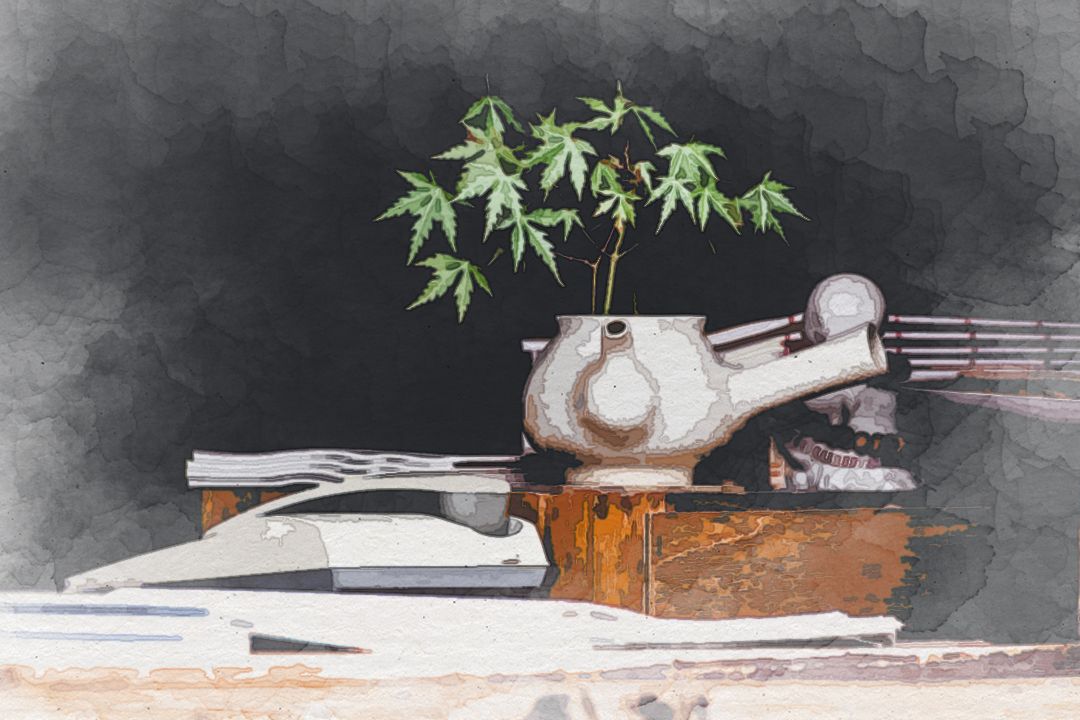"What Kind of Boot?" asked the Buddha

Don't Turn Your Back on me, Buddha
In the dimly lit room's hushed corners, a solitary figure sat amidst the soft glow of candlelight. The Buddha statue, serenely observing from an elevated perch, cast its gaze downward, an omnipresent symbol of enlightenment embracing the scene.
In the dimly lit room's hushed corners, a solitary figure draped in shadows sat amidst the soft glow of flickering candlelight. With its serene countenance, the Buddha statue was observed from an elevated perch, casting a tranquil aura that seemed to permeate the air.
As the narrator delved into contemplation, a distant memory flickered like a dancing flame, invoking the ageless wisdom of philosophers long past. Thoughts danced like shadows, meandering through the intricate labyrinth of the mind. The embodiment of enlightenment, the Buddha, remained an unwavering presence, a silent witness to the musings unfolding in the room.
Like dissipating mist, the memory gave way to a rebellion on the windowsill – an unruly pot plant, its tendrils reaching out in chaotic defiance. Its wild growth, a stark contrast to the ordered serenity of the Buddha, captured attention. The tendrils seemed to dance in rebellion against the carefully arranged order of the room.
The narrator's train of thought momentarily derailed. Frustration etched their features as they sought to regain the thread of the interrupted contemplation. The room, once a haven of serenity, now bore the undertones of a struggle between order and chaos.
The unruly pot plant continued its defiance, casting erratic shadows that danced across the walls. The soft glow of the candlelight flickered, creating a play of light and shadow that mirrored the narrator's internal conflict. What was initially a haven for introspection became a battleground of conflicting thoughts.
Yet, amidst the philosophical musings and the internal tumult, a line of beauty emerged like a delicate flower pushing through concrete. The room retained its atmospheric tension but had an underlying sense of solace. The moment's beauty lay in the delicate dance between order and chaos, a reminder that even in the most rebellious elements, there could be a certain harmony.
Caught in the crossroads of memory and revelation, the narrator's attention lingered. A peculiar urge surfaced, a deviation from the serene contemplation. The pot plant, once a symbol of defiance, now held a certain allure, representing the unpredictability of existence.
In crafting this immersive scene, the intent is to draw readers into a world where the profound meets the mundane, where the echoes of wisdom and rebellion intertwine with the soft glow of candlelight. The challenge lies in creating a tapestry that captivates the senses, allowing the reader to feel the tension, the beauty, and the subtle shifts within the contemplative space.
If you want a vision of the future, imagine a boot stamping on a human face - forever.
— George Orwell (1903-1950)
In the dimly lit room's hushed corners, a solitary figure draped in shadows sat amidst the soft glow of flickering candlelight. With its serene countenance, the Buddha statue was observed from an elevated perch, casting a tranquil aura that seemed to permeate the air.
As the narrator delved into contemplation, a distant memory flickered like a dancing flame, invoking the ageless wisdom of philosophers long past. Thoughts danced like shadows, meandering through the intricate labyrinth of the mind. The embodiment of enlightenment, the Buddha, remained an unwavering presence, a silent witness to the musings unfolding in the room.
Like dissipating mist, the memory gave way to a rebellion on the windowsill – an unruly pot plant, its tendrils reaching out in chaotic defiance. Its wild growth, a stark contrast to the ordered serenity of the Buddha, captured attention. The tendrils seemed to dance in rebellion against the carefully arranged order of the room.
The narrator's train of thought momentarily derailed. Frustration etched their features as they sought to regain the thread of the interrupted contemplation. The room, once a haven of serenity, now bore the undertones of a struggle between order and chaos.
The unruly pot plant continued its defiance, casting erratic shadows that danced across the walls. The soft glow of the candlelight flickered, creating a play of light and shadow that mirrored the narrator's internal conflict. What was initially a haven for introspection became a battleground of conflicting thoughts.
Yet, amidst the philosophical musings and the internal tumult, a line of beauty emerged like a delicate flower pushing through concrete. The room retained its atmospheric tension but had an underlying sense of solace. The moment's beauty lay in the delicate dance between order and chaos, a reminder that even in the most rebellious elements, there could be a certain harmony.
As the narrator's thoughts circled the chaotic beauty of the pot plant, a realization dawned – poetry is a sort of homecoming. The words echoed through the room, a gentle affirmation that amidst the philosophical complexities and rebellious elements, there was a sense of returning to a place of inner tranquillity. Expressing thoughts through poetic language became a homecoming, a refuge amidst the intellectual storm.
Caught in the crossroads of memory and revelation, the narrator's attention lingered. A peculiar urge surfaced, a deviation from the serene contemplation. The pot plant, once a symbol of defiance, now held a certain allure, representing the unpredictability of existence.
In crafting this immersive scene, the intent is to draw readers into a world where the profound meets the mundane, where the echoes of wisdom and rebellion intertwine with the soft glow of candlelight. The challenge lies in creating a tapestry that captivates the senses, allowing the reader to feel the tension, the beauty, and the subtle shifts within the contemplative space.
Poetry is a sort of homecoming.
— Paul Celan (1920-1970)
A solitary figure sat surrounded by flickering candlelight in a dimly lit room. A Buddha statue, serene and elevated, watched over the scene.
Lost in thought, the narrator's contemplation was interrupted by a rebellious pot plant on the windowsill. Its unruly growth contrasted with the room's order, causing a momentary distraction.
Frustration crept in as the narrator grappled with the interrupted contemplation. The room, once serene, now felt like a battleground of conflicting thoughts.
This scene aims to depict a simple yet tense setting, where the interplay of order and chaos mirrors the narrator's internal struggle.
I felt like poisoning a monk.
— Umberto Eco (1932-2016)
... a dark thought, a deviation from contemplation. The juxtaposition created narrative tension, ideas vying for dominance.
In crafting this story, the intent is to captivate, drawing readers into a world where the profound meets the mundane. The challenge lies in seamlessly weaving disparate elements, leaving an indelible impression on the reader's mind.

The planksip Writers' Cooperative is proud to sponsor an exciting article rewriting competition where you can win over $750,000 in prize money.
Figures of Speech Collection Personified
Our editorial instructions for your contest submission are simple: incorporate the quotes and imagery from the above article into your submission.
What emerges is entirely up to you!
Winners receive $500 per winning entry multiplied by the article's featured quotes. Our largest prize is $8,000 for rewriting the following article;

At planksip, we believe in changing the way people engage; at least, that's the Idea (ἰδέα). By becoming a member of our thought-provoking community, you'll have the chance to win incredible prizes and access our extensive network of media outlets that will amplify your voice as a thought leader. Your membership truly matters!


